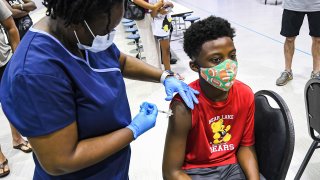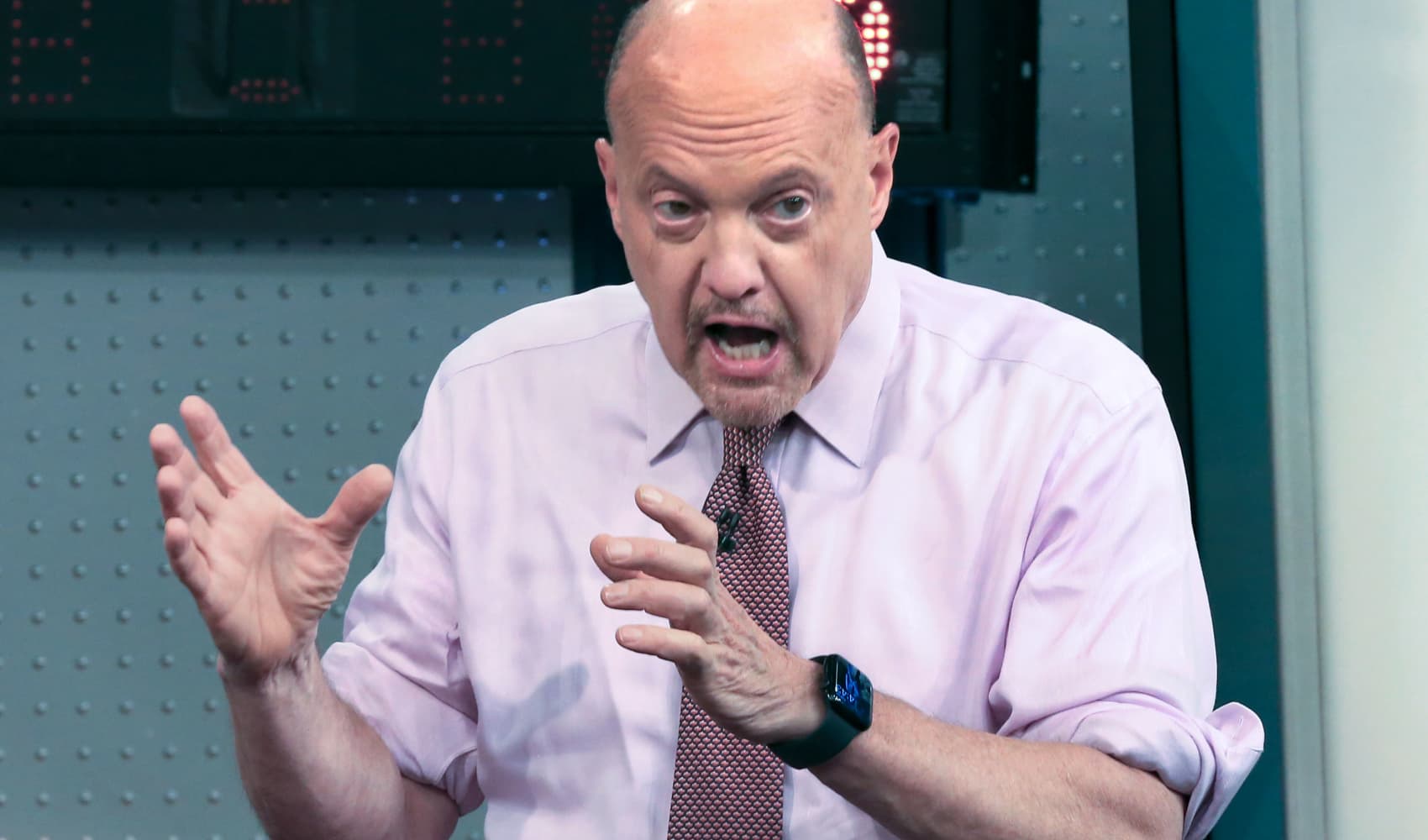
The CDC's Advisory Committee on Immunization Practices' all-day meeting on Pfizer's Covid-19 vaccine for kids ages 5 to 11 has ended. Click here to read all of CNBC's Covid coverage.
The CDC's Advisory Committee on Immunization Practices meets Tuesday for an all-day meeting on Pfizer and BioNTech's Covid-19 vaccine for kids ages 5 to 11.
The FDA granted emergency approval for the shots on Friday. The White House said Monday it began the process Friday of moving 15 million doses from Pfizer's freezers and facilities to distribution centers. The Biden administration said it's procured enough vaccine to inoculate all 28 million 5- to 11-year-olds in the U.S., and will distribute it in smaller dosing and with smaller needles to make it easier for pediatricians and pharmacists to administer to kids.
The meeting starts at 11 a.m. ET and is scheduled to wrap up around 5 p.m. with a vote on whether to recommend the shots at the end of the day. Shots could be administered to kids as early as tonight, depending on how fast CDC Director Rochelle Walensky acts on the panel's recommendation.
Get Boston local news, weather forecasts, lifestyle and entertainment stories to your inbox. Sign up for NBC Boston’s newsletters.
CDC panel unanimously recommends Pfizer’s Covid vaccine for kids
The CDC's Advisory Committee on Immunization Practices unanimously recommended Pfizer's and BioNTech's Covid-19 vaccine for children ages 5 to 11, sending it to Director Dr. Rochelle Walensky for her final approval.
Money Report
If she signs off on the recommendation, which is expected as early as late Tuesday, vaccinations for young kids could begin immediately. As many as 28 million kids in the U.S. are eligible for the shots, which will be administered at one-third of the dosage for teens and adults.
Some parents say they are counting down the minutes until U.S. regulators clear the shots and can get their kids back to "normal" in-person learning, sports and other extracurricular activities that were largely put on hold due to the pandemic.
The White House said Monday it's already begun moving 15 million doses from Pfizer's freezers and facilities to distribution centers.
–Berkeley Lovelace Jr.
CDC advisory committee begins vote on Pfizer kids' shots
The committee has begun voting on whether to recommend Pfizer's vaccine for emergency use in 5- to 11-year-olds.
The advisory panel concluded debate on the data and side effects of the shots at about 4:57 p.m. before the panel turned its attention to the vote.
Ahead of the vote, several members of the committee said they would support the proposal.
"The reason I'm voting for this is individual protection," said Chair Dr. Grace Lee. "I value preventing infection in children, and I think it can have a huge positive impact on their health, their social and emotional wellbeing, their educational outcomes, and their long-term trajectory."
The group's recommendation to the CDC, which isn't binding, is estimated to take about two minutes.
— Robert Towey
Georgia, Kentucky, Tennessee and Texas have had the most school closures due to Covid, CDC says
Covid outbreaks have closed more than 2,300 schools this year, affecting more than 1.2 million students and over 78,000 teachers since August, CDC medical officer Dr. Sara Oliver told the agency's advisory committee.
Georgia, Kentucky, Tennessee and Texas have had the most school closures, Oliver reported, citing data aggregated from the agency's School Dismissal Monitoring System from Aug. 2 to Oct. 22. Covid-related closures impacted at least 12 million students in roughly 19,000 schools nationwide during the 2020-2021 school year as well, Oliver added.
"Covid in children leads to missed school for themselves and their communities," Oliver said. "And wide use of an effective vaccine would reduce the public health burden of Covid in children 5 through 11 years of age."
— Robert Towey
Kid size Covid vaccine can be stored at ultra cold temps for 6 months, CDC says
Pfizer's Covid vaccine shots for kids, which are one-third of the dosage for teens and adults, will remain stable at ultracold temperatures for up to 6 months, Dr. Kate Woodworth of the CDC's birth defects division told the committee.
By comparison, the Pfizer doses for teens and adults can be stored at ultracold temperatures – negative 90 degrees Celsius to negative 60 degrees Celsius – for up to 9 months, she said.
The vaccine will also come in different packaging, she said. The kids' shots will come in orange capped and labeled vials as opposed to the purple vials for those 12 and older. A child can still receive the child-sized dose as their second shot if they turn 12 years of age after the first dose, she added.
"Children should receive the age-appropriate vaccine formulation regardless of their size and weight," she said, unlike for other medications.
–Berkeley Lovelace Jr.
Parents can report side effect to the CDC's v-safe app
Parents will be able to report vaccine side effects for their 5- to 11-year-olds through v-safe, the CDC's safety monitoring platform for smartphones, researcher Dr. Tom Shimabukuro told the agency's advisory committee.
V-safe asks parents to enroll their children and log their symptoms once a day for the first week post-vaccination, compiling information on their sex, age, race, ethnicity and health impacts by dose received. The CDC will then compare that data to the side effects reported for adolescents ages 12 to 17, Shimabukuro said.
"The v-safe check-in schedule is the same for all ages," Shimabukuro said. "It's once a day, day zero through seven, and after that once a week through six weeks, and then at three, six and 12 months. And the schedule restarts after each dose received."
The CDC will also analyze side effects reported through health-care centers participating in the Vaccine Safety Datalink and the Clinical Immunization Safety Assessment Project, among other symptom tracking networks monitored by the agency.
— Robert Towey
Hormones in teens may play role in myocarditis cases, CDC officials say
Myocarditis, a rare heart inflammation condition that's been associated with the Pfizer and Moderna vaccines, is not expected to be as prevalent in kids ages 5 to 11 as it is in teens, Dr. Matthew Oster, a pediatric cardiologist with the CDC, told the committee.
"There are a number of different physiological mechanisms and rationales for why that is," Oster said, noting nothing has been proven yet. "One of the most common thoughts though, is that certainly, hormones play a role, specifically for testosterone."
He said the agency is actively investigating reported cases of myocarditis, which has been found most prevalently in young men.
Last week, officials said there been 1,640 cases of myocarditis reported in people under 30 who received Pfizer or Moderna's vaccines as of Oct. 6. Just 877 met the CDC's case definition for myocarditis, and 637 of the reported cases are still under review, they said at the time.
–Berkeley Lovelace Jr.
Kids 5 to 11 make up 44% of all Covid MIS-C cases in U.S., CDC says
Children ages 5 to 11 represent 44% of the 5,217 Covid-related multi-system inflammatory syndrome cases reported nationally, CDC medical officer Dr. Jefferson Jones told the agency's advisory committee.
Jones evaluated MIS-C data measured from Feb. 19, 2020 to Sept. 23, 2021, noting that the nine deaths among the 5-to-11 age group represented 20% of the country's total. Black, Hispanic and Latino children comprised a "disproportionate" share of all the pediatric MIS-C cases at 61%.
He also said kids can develop fatigue, headaches, insomnia, muscle pain and difficulty concentrating weeks after contracting the virus.
"Few data on post-Covid conditions and children exist," Jones said. "It appears that post-Covid conditions in children is less common than among adults."
"Further investigation is needed to better characterize post-Covid conditions in children," he added.
— Robert Towey
Covid infections in children less likely to be reported, CDC official says
Children and adults catch Covid-19 at similar rates, but infections in kids are less likely to be reported, CDC official Dr. Jefferson Jones told the committee, suggesting the true number of pediatric cases in the U.S. could be much higher.
Of the children ages 5 to 11 infected and hospitalized with Covid from March of last year through August, 37% were Black and 31% were Hispanic, he said. About 68% of the kids in total had an underlying medical condition. The most common conditions were chronic lung disease, primarily asthma, and obesity, he said.
Hospital stays for kids ages 5 to 11 with Covid were on average longer than children hospitalized with the seasonal flu, he said. Young kids with Covid were also more likely to be admitted to the ICU, when compared to those who had the flu, he added.
–Berkeley Lovelace Jr.
Moms Oppose Mandates asks panel to soften recommendation
Christina Dietrich, a representative of Delaware Moms Oppose Mandates, asked the committee during its public comment period to soften its final recommendation so it doesn't embolden states and school districts to impose vaccine mandates.
Dietrich claimed there was a lack of evidence demonstrating the shots reduce severe disease and death among children, calling on ACIP to give parents more time to wait for extra data on the vaccines' effectiveness.
"We beg you to say that kids 5 to 11 may receive the vaccine, not that they should," Dietrich said. "Otherwise, your approval will be used to enact mandates unjustified by an EUA."
— Robert Towey
No cases of anaphylaxis or myocarditis in Pfizer study, company says
There were no cases of anaphylaxis, a potentially life-threatening allergic reaction, or myocarditis, a rare heart inflammation, in Pfizer's clinical trial of children ages 5 to 11, Dr. Alejandra Gurtman, vice president of vaccine clinical research and development at the company, told the committee. Both conditions are listed as a severe, but extremely rare, potential side effects to the vaccine in people 16 and older in the U.S.
There were also no cases of Bell's palsy – which federal regulators had previously said they were monitoring for in adult vaccine recipients – or appendicitis, she said. Bell's Palsy has been flagged by regulators in Canada as a potentially rare reaction mostly in adults.
Side effects from the shots were mostly mild to moderate, with vaccine-induced fever being less common in this age group than a study of those ages 16 to 25, she said. The observed adverse events in the study did not suggest any safety concerns, she added.
–Berkeley Lovelace Jr.
2,316 kids ages 5 to 11 have suffered from Covid-related inflammatory syndrome
At least 2,316 kids ages 5 to 11 have suffered from multisystem inflammatory syndrome in children, or MIS-C, a rare but serious Covid-related complication, CDC adviser Dr. Matthew Daley told the committee during a presentation.
In addition, there have been at least 1.9 million Covid cases in this age group, 8,300 hospitalizations and at least 94 deaths, he said. The burden of the pandemic extends beyond case counts, he said, adding Covid has caused school closures nationwide.
Pfizer and BioNTech are asking to give two 10 microgram doses of their vaccine – a third the dosage given to teens and adults – three weeks apart to young children, he said. The vaccine has already been cleared for people as young as 12.
–Berkeley Lovelace Jr.
CDC announces a second public comment period Wednesday
ACIP Executive Secretary Dr. Melinda Wharton said the panel plans to hold two public comment periods on Pfizer's kids vaccine, scheduling a second one on Wednesday at approximately 3:45 p.m. Eastern time.
"Engagement with the public and transparency in our processes is vital to the committee's work," she said.
Anyone interested in commenting can submit a request on the agency's website to speak tomorrow or submit a written comment online. The committee will pick participants through a blind lottery, but Wharton said priority will be given to comments filed in advance.
Information on the comment process is posted on the advisory committee's website, Wharton said. ACIP's first public comments will start today at 12:10 p.m.
— Robert Towey
CDC director says committee vote today will have 'tremendous impact'
Centers for Disease Control and Prevention Director Dr. Rochelle Walensky addressed the vaccine advisory committee at the start of the meeting Tuesday, saying their vote on whether to recommend Pfizer's vaccine for kids ages 5 to 11 will have a "tremendous impact."
Pediatric Covid-19 hospitalizations have surged amid the spread of the delta variant, reaching a rate of 25 hospitalizations per 100,000 persons per year in children ages 5 to 11, Walensky said. There have been 745 deaths among those under age 18, including 94 deaths in kids ages 5 to 11, she added.
"The chances a child will have severe Covid, require hospitalization or develop a long term complication like MIS-C remains low but still the risk remains too high and too devastating to our children and far higher for many other diseases for which we vaccinate our children," she said.
–Berkeley Lovelace Jr.






